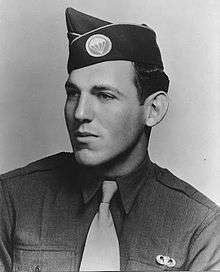Edward Tipper
| Edward J. Tipper, Jr. | |
|---|---|
 | |
| Nickname(s) | Ed |
| Born |
August 3, 1921 Detroit, Michigan, United States |
| Allegiance |
|
| Service/branch |
|
| Years of service | 1942–1945 |
| Rank |
|
| Unit |
|
| Battles/wars | |
| Relations |
-Rosie Tipper (wife) -Kerry Tipper (daughter) |
Private First Class Edward Tipper (born August 3, 1921) is a former private of the Easy Company, 2nd Battalion, 506th Parachute Infantry Regiment in the 101st Airborne Division, United States Army during the Second World War. He is one of the 140 original Toccoa men of Easy Company. Tipper was portrayed in the HBO miniseries Band of Brothers by Bart Ruspoli. Tipper's life story was featured in the 2009 book We Who Are Alive and Remain: Untold Stories from Band of Brothers
Youth
Tipper was born in Detroit, Michigan in 1921 to an Irish couple. The family moved back to Ireland when Tipper was three years old, but they returned to the United States later. Tipper graduated from a Detroit school in 1939 and worked at a department store.[1]
Military Service
After the Attack on Pearl Harbor, Tipper signed up for the Marine Corps, but was rejected because his teeth could not bite together.[2] He therefore volunteered for the paratroopers, and was sent to Toccoa, Georgia and was assigned to Easy Company for training under Captain Herbert Sobel. During the training in Camp Mackall, Tipper was made Sobel's runner; with his help, "Sobel was able to mislay his maps, compass, and other items when he most needed them."[3] Tipper received further training with Easy Company in Aldbourne, United Kingdom.
Tipper made his first combat jump into Normandy on D-Day, where he met with fellow Easy Company member Frank Mellet and some other paratroopers and engaged in a firefight with a German patrol.[4] Later, the men attacked the Marmion Farm. Some other Easy Company members, including Floyd Talbert, Forrest Guth and Walter Gordon, were also involved in the attack, albeit with another group of American soldiers. The soldiers held the place before joining their own units.[5]
Tipper fought in Carentan: after clearing a house, a mortar shell exploded near him when he was standing in the doorway. His right eye was destroyed and his legs were broken. Joseph Liebgott, fellow Easy Company member, was the first one to reach him and attended to him; Liebgott and Harry Welsh then dragged Tipper to a nearby aid station.[6] Tipper was sent to a hospital in England, where his right eye was removed.[6] He was then sent back to the United States.
Later life
Several months after the war, Tipper visited good friend Floyd Talbert's family. Talbert told his family that the visitor could only be someone else, because he thought Tipper must have died from his injury in Carentan.[6] Tipper was discharged in August 1945 after one year in Army hospitals.[7] At first Tipper needed to walk with a cane and wore an eye patch. Tipper remembered how everybody wanted to do something to show support for the returning war veterans. For instance, someone would pay his bill for him at a restaurant or there would be no bill at all.[8]
Tipper attended the University of Michigan and completed his master's degree in English at the University of Northern Colorado,[7] and became a teacher. In 1961 he won the John Hay Fellowship.[9] When Tipper was sixty one, he met Rosie (who was then thirty four) and they were married on February 12, 1983.[9] Their daughter Kerry was born ten months later.[10]
Medals and decorations
References
Bibliography
- Brotherton, Marcus (2009). We Who Are Alive and Remain: Untold Stories from Band of Brothers. Berkley Trade. ISBN 0425234193.
- Ambrose, Stephen E. (1992). Band of Brothers: Easy Company, 506th Regiment, 101st Airborne from Normandy to Hitler's Eagle's Nest. Simon & Schuster. ISBN 978-0-7434-6411-6.
